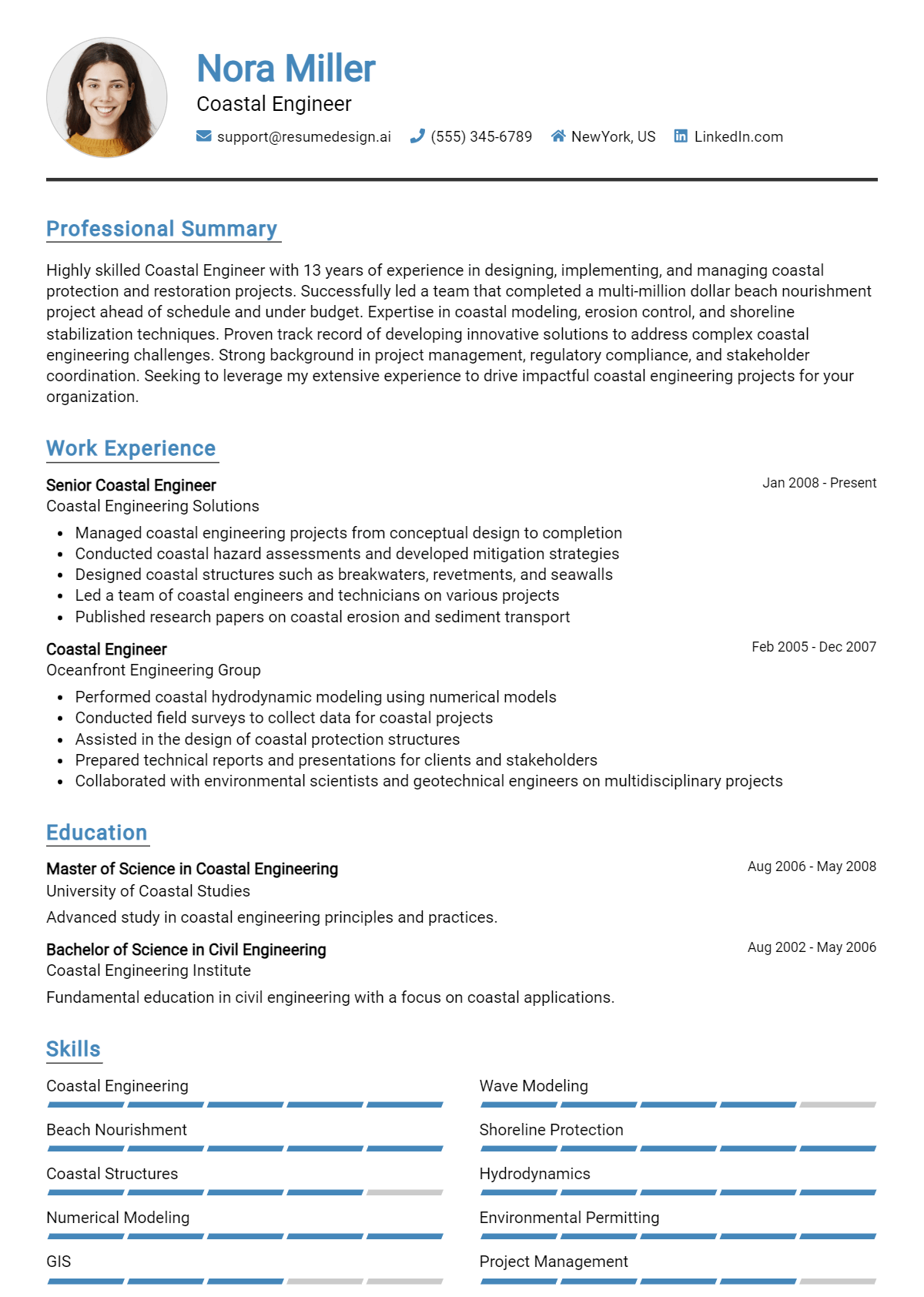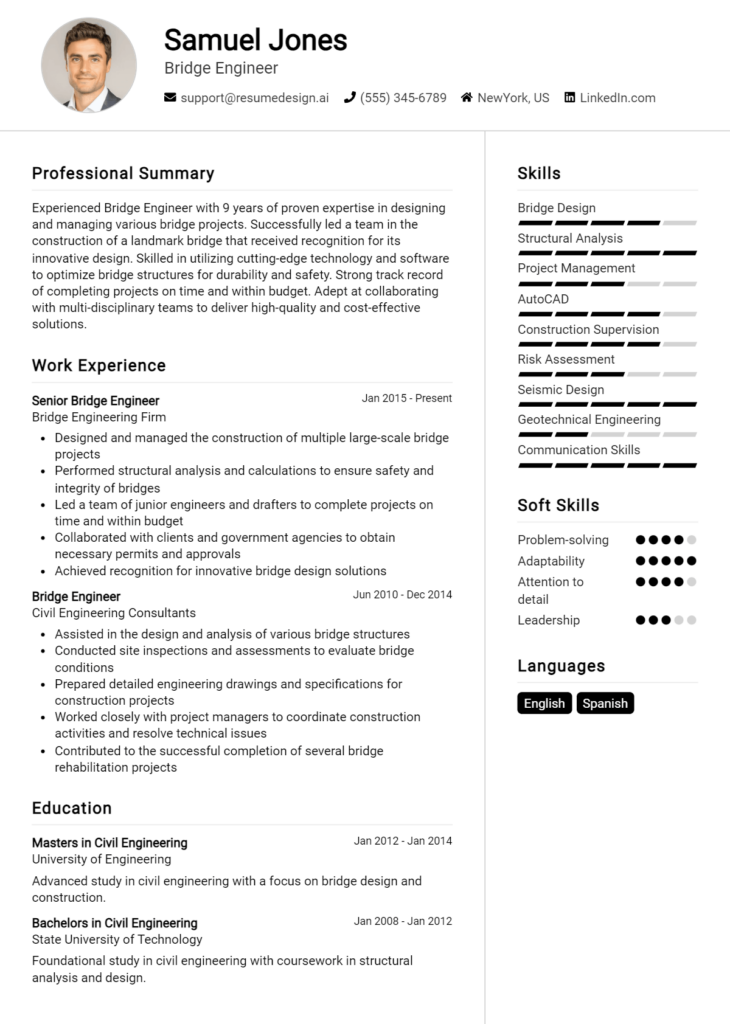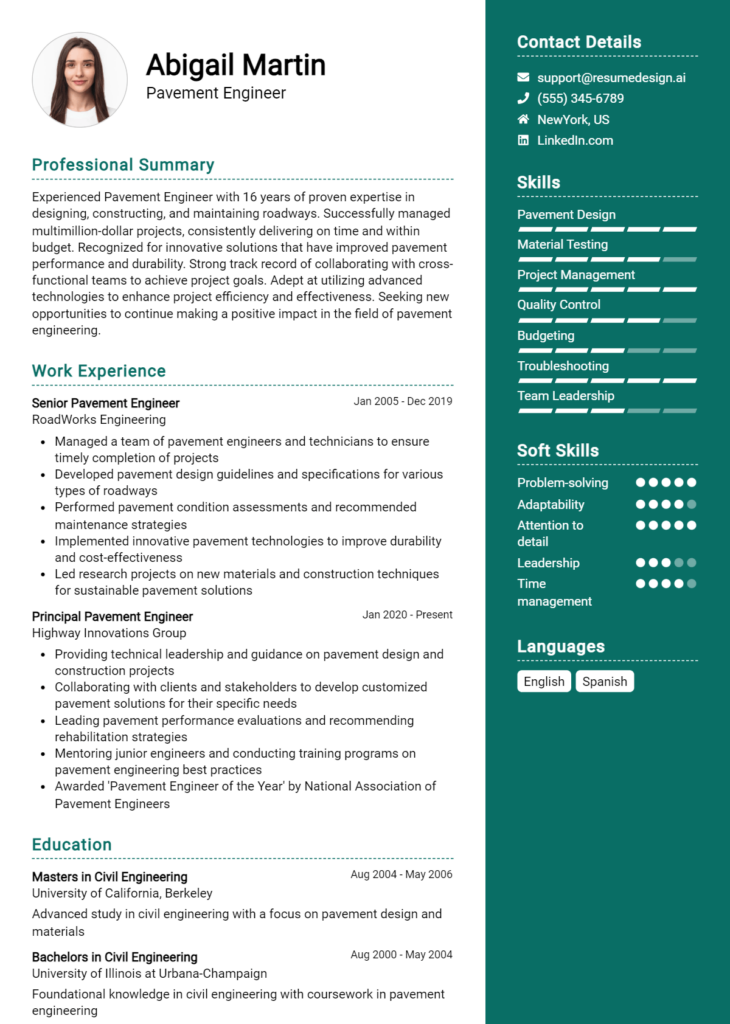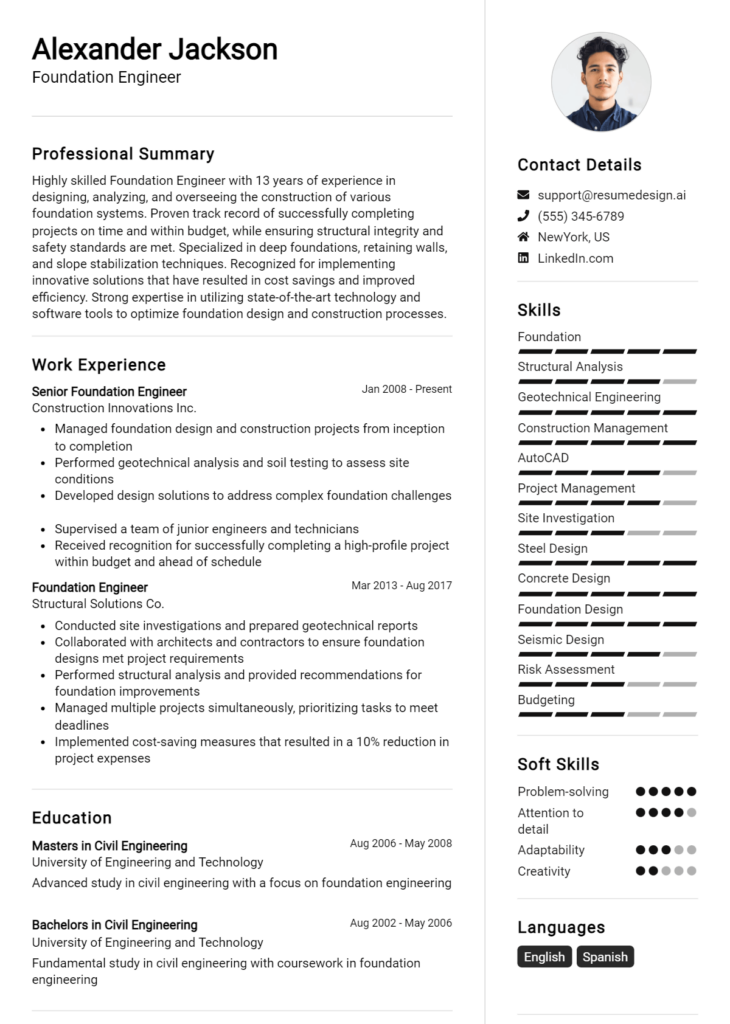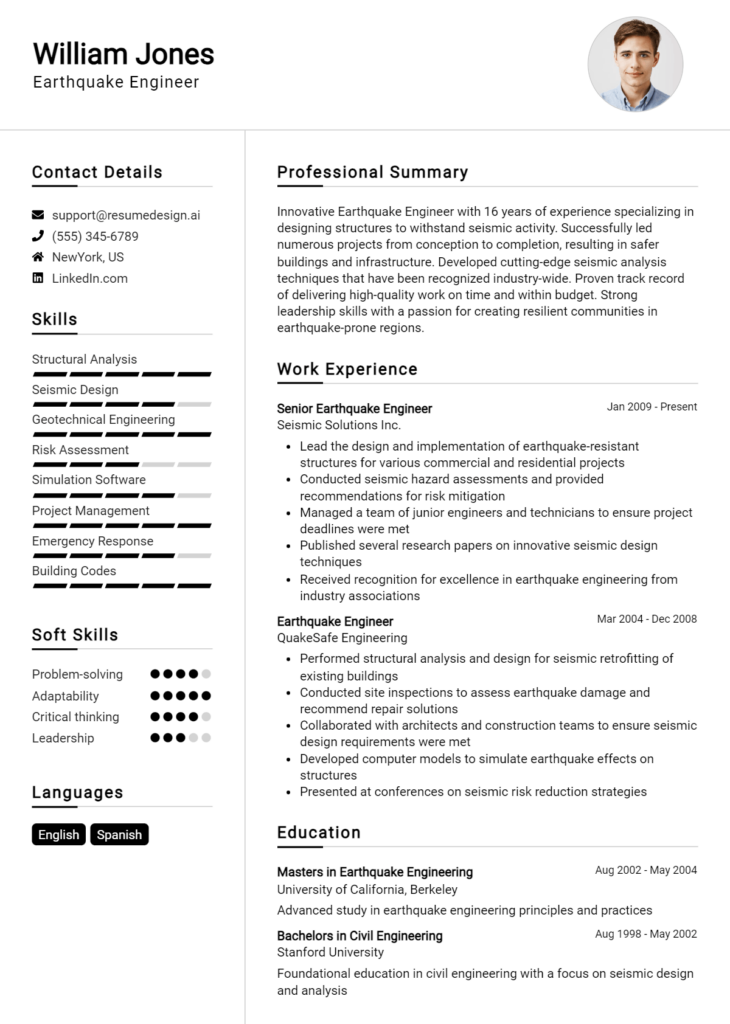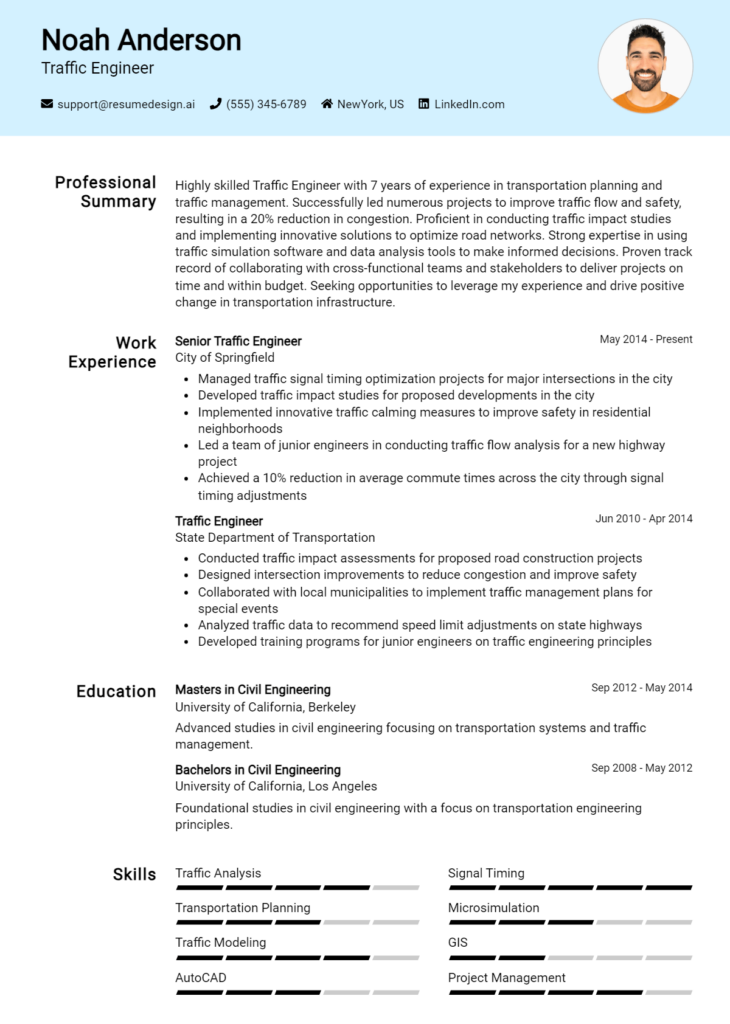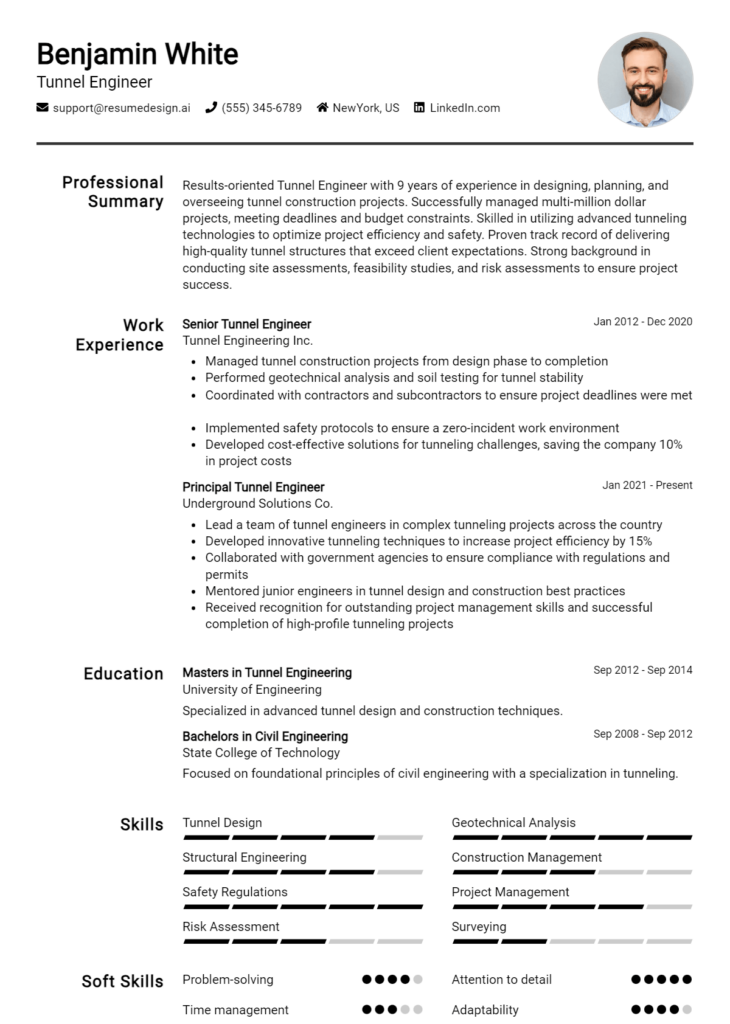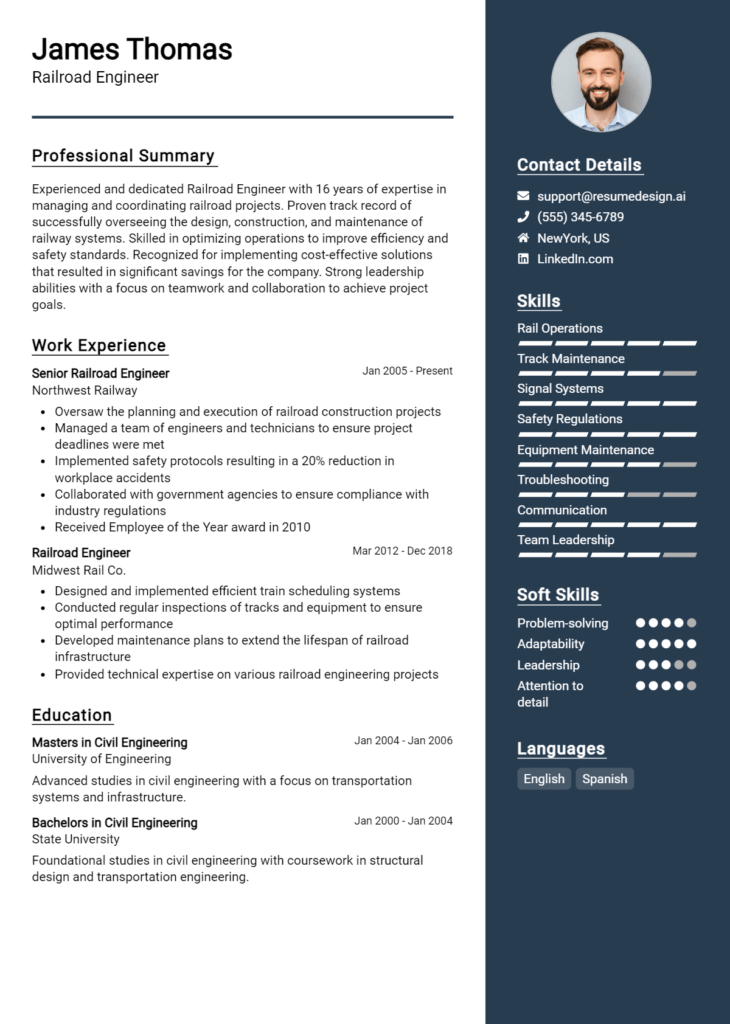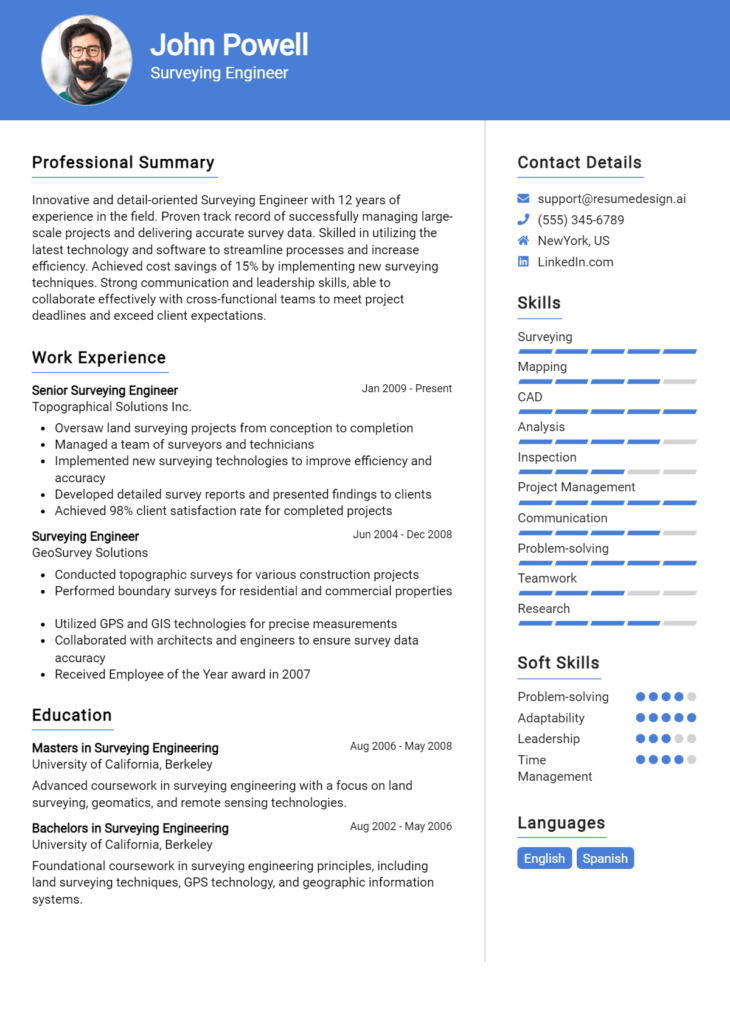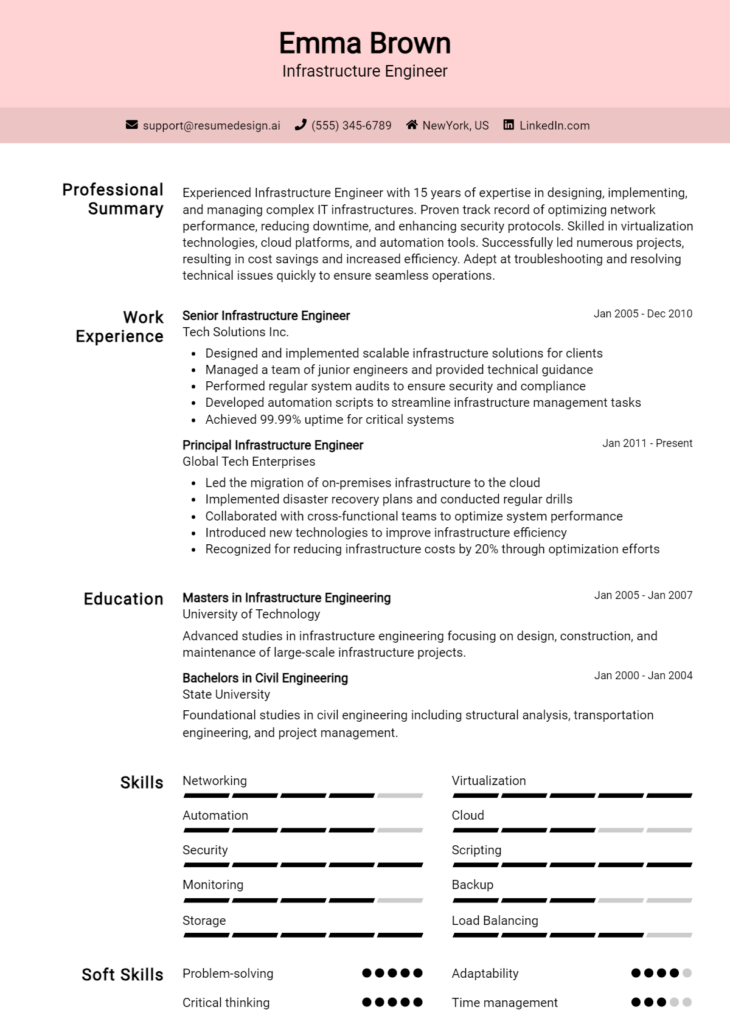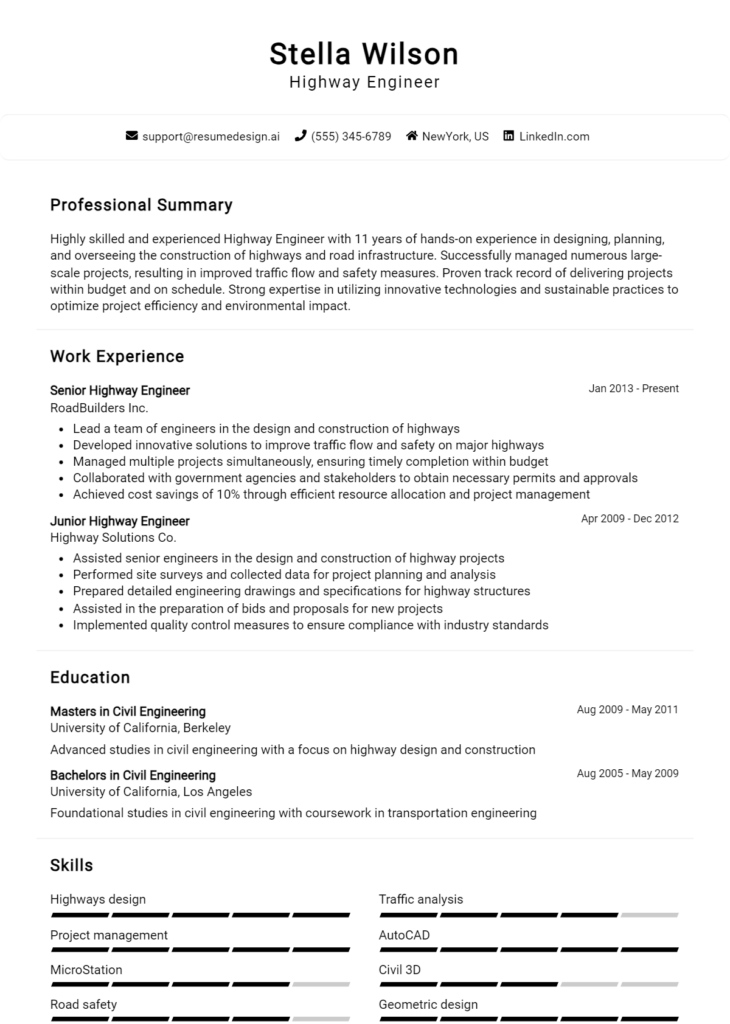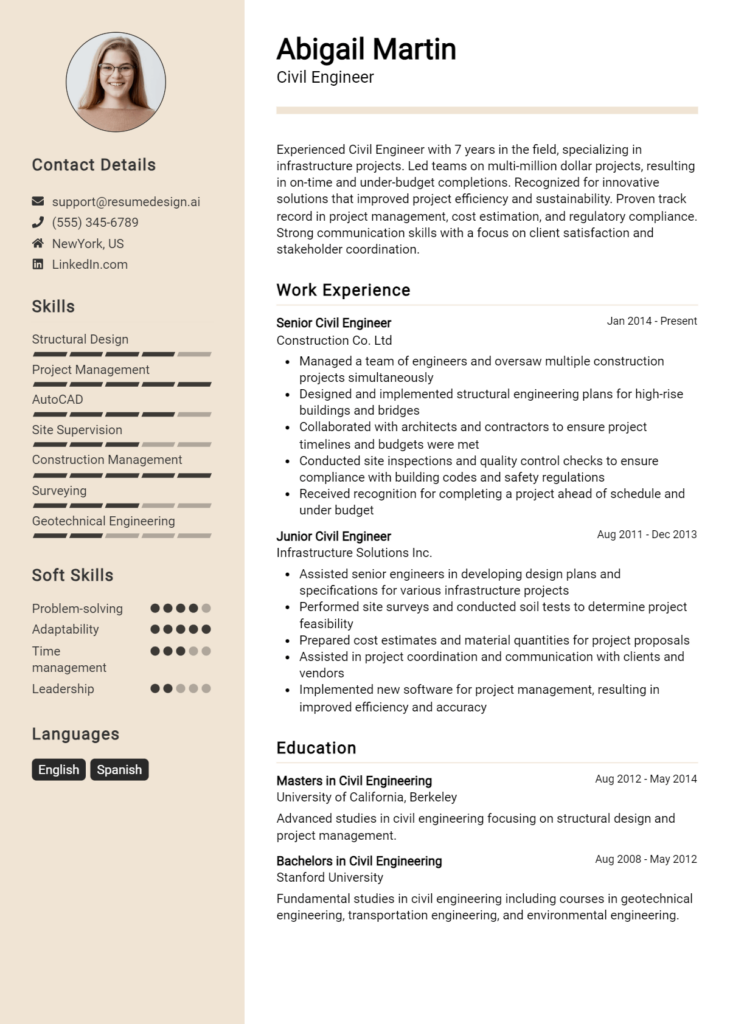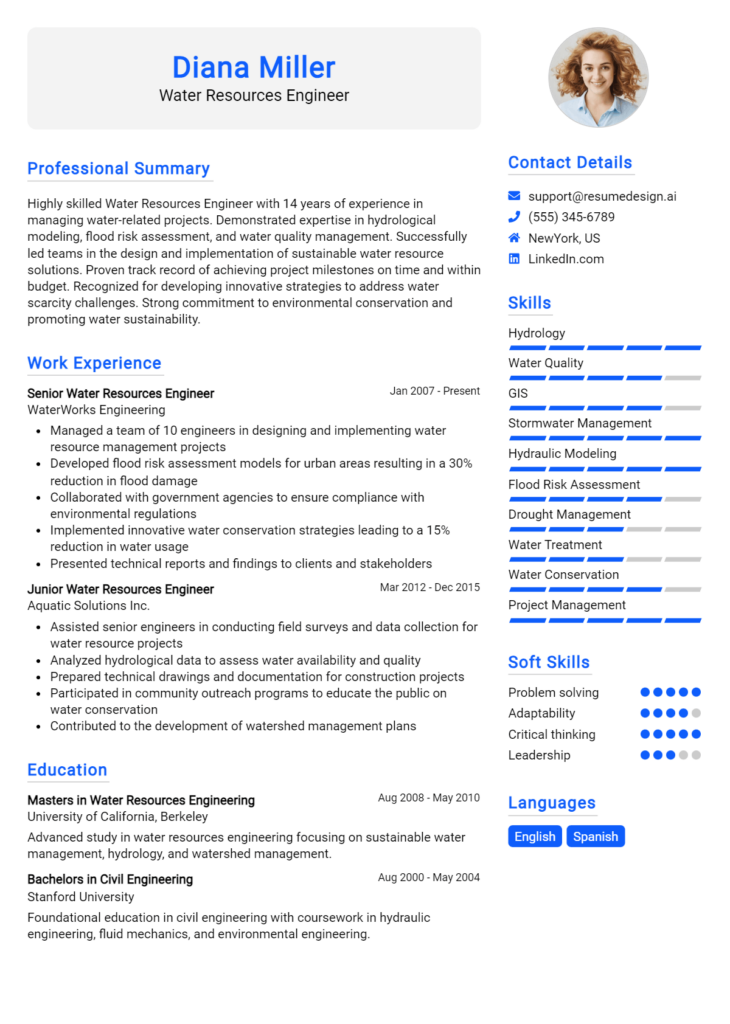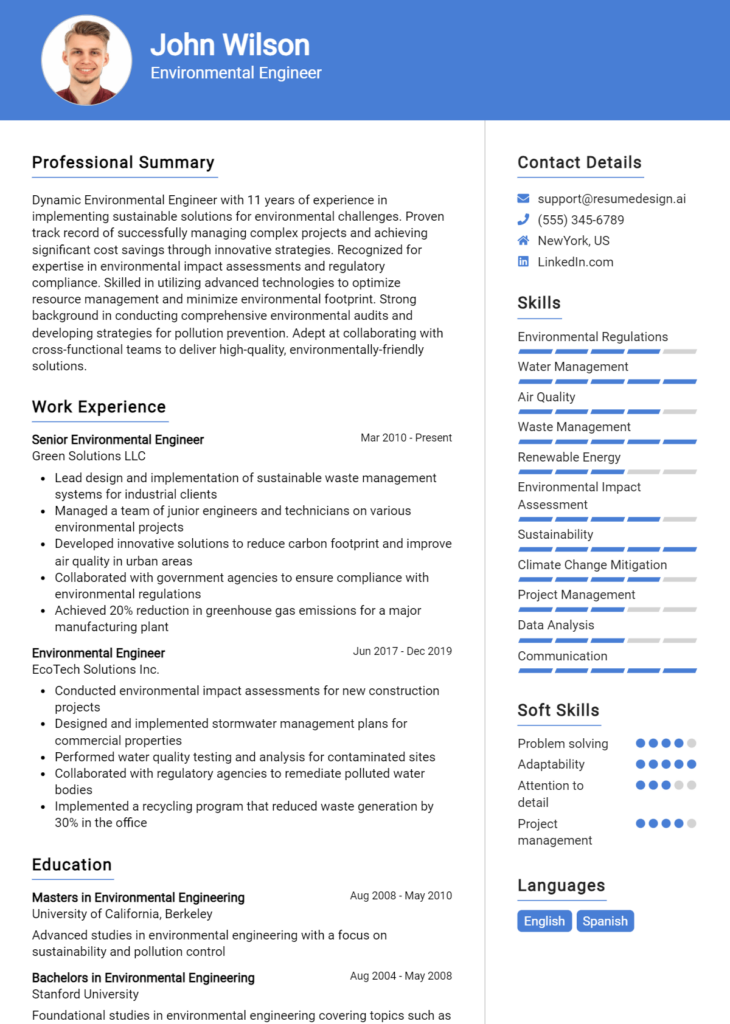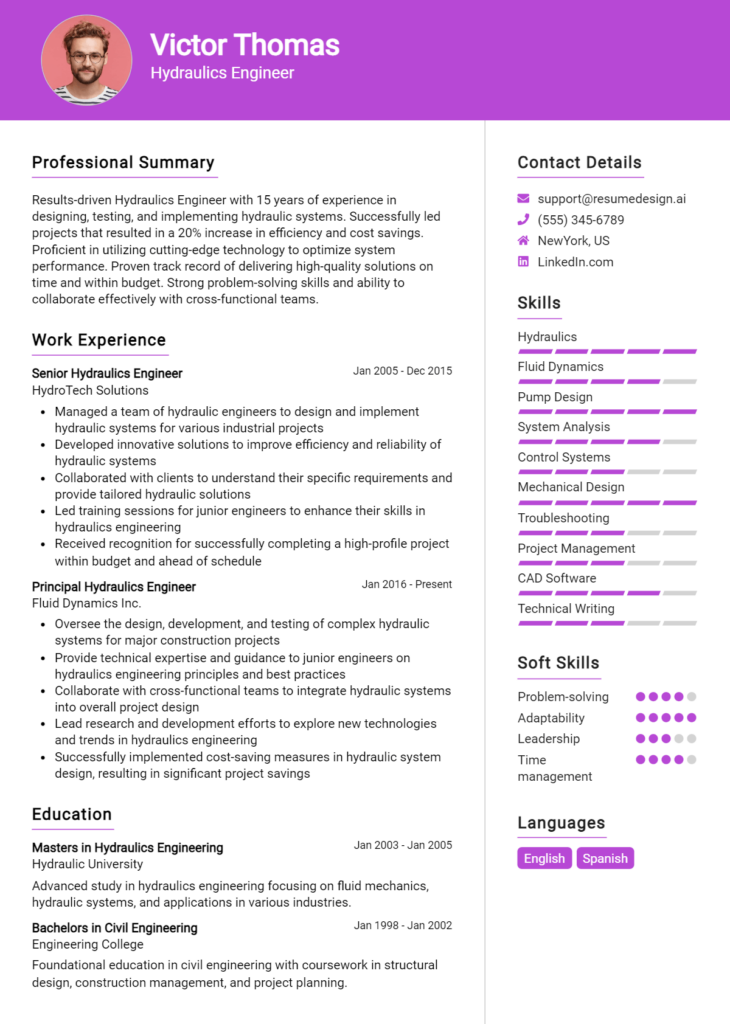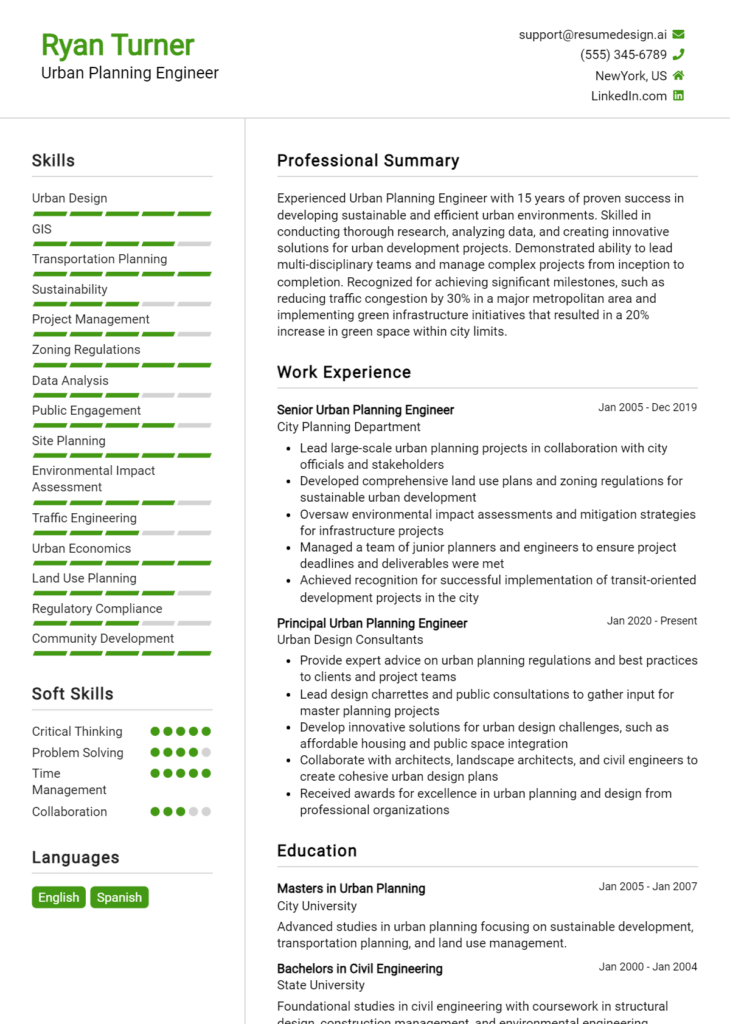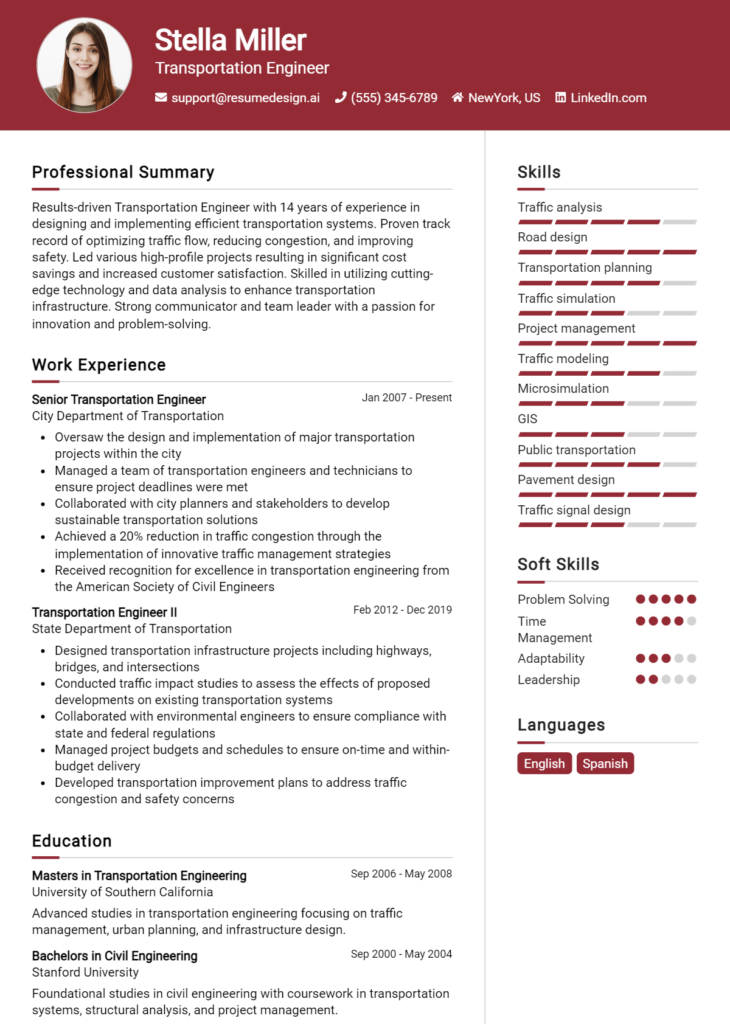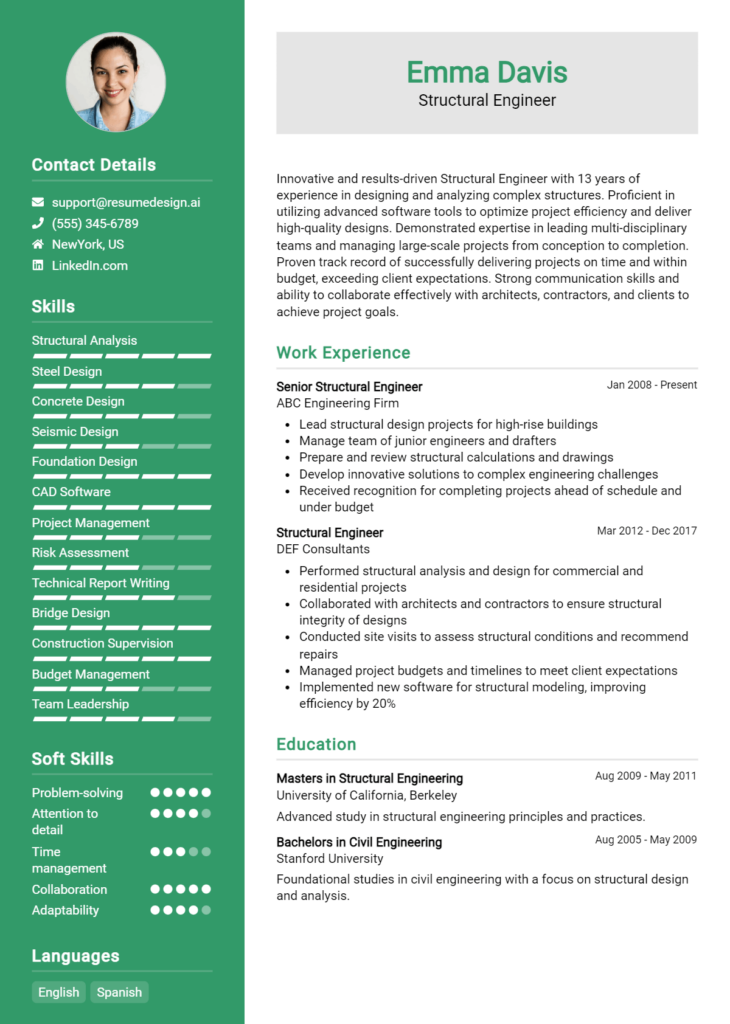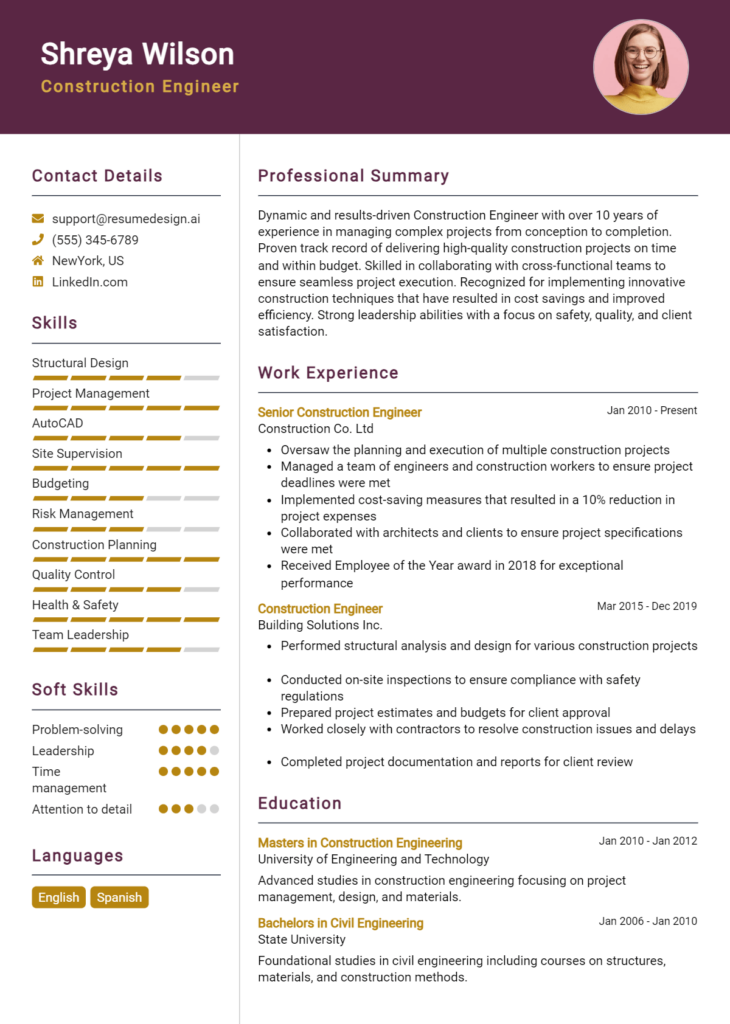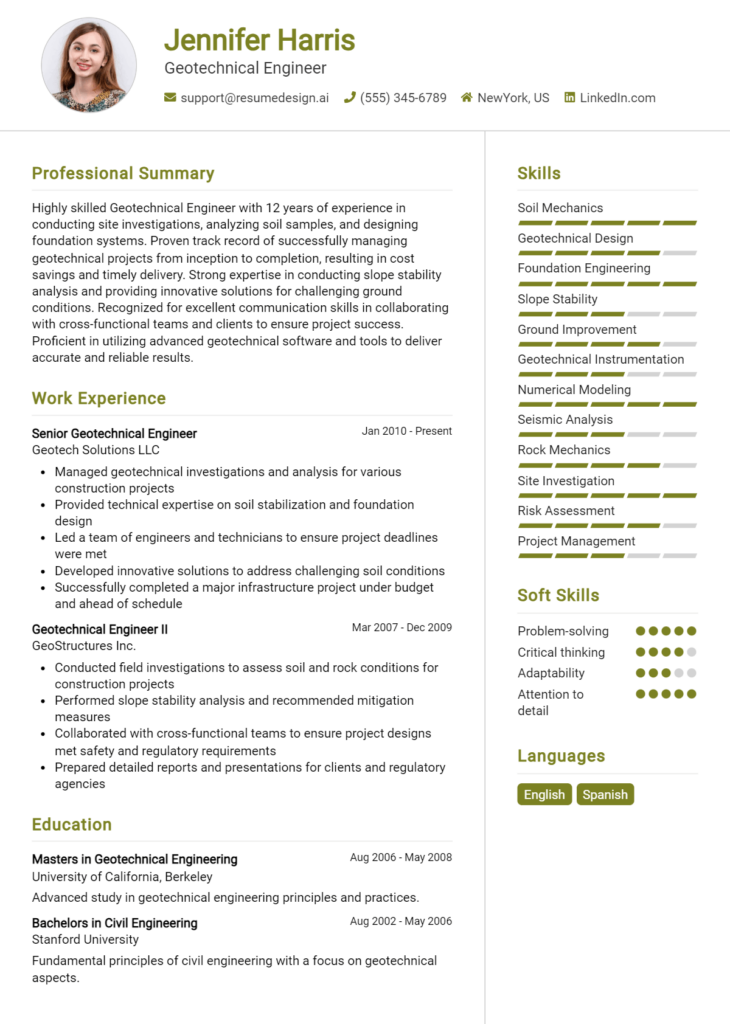Coastal Engineer Core Responsibilities
A Coastal Engineer plays a vital role in designing and implementing solutions to manage coastal areas and mitigate erosion. Key responsibilities include conducting site assessments, modeling coastal processes, and collaborating with environmental scientists, urban planners, and construction teams. Essential skills encompass technical expertise in hydraulic engineering, operational knowledge of marine systems, and strong problem-solving abilities. These competencies are crucial for achieving organizational goals, and a well-structured resume can effectively highlight these qualifications, demonstrating the candidate’s readiness for complex challenges.
Common Responsibilities Listed on Coastal Engineer Resume
- Conducting coastal assessments and feasibility studies.
- Designing coastal protection structures such as seawalls and jetties.
- Modeling coastal processes and predicting erosion patterns.
- Collaborating with multidisciplinary teams on project development.
- Preparing technical reports and presentations for stakeholders.
- Evaluating environmental impacts of coastal projects.
- Overseeing construction and ensuring compliance with regulations.
- Developing and implementing coastal management plans.
- Performing data analysis and interpreting survey results.
- Monitoring and maintaining coastal infrastructure.
- Advising on policies related to coastal development and conservation.
High-Level Resume Tips for Coastal Engineer Professionals
For Coastal Engineer professionals, a well-crafted resume is not just a document; it’s a crucial tool that can unlock doors to exciting career opportunities. It serves as the first impression a candidate makes on a potential employer, showcasing not only technical skills but also the achievements that set them apart in a competitive field. A strong resume must effectively reflect the unique blend of engineering expertise and coastal management knowledge, tailored to resonate with the specific requirements of the job. This guide will provide practical and actionable resume tips specifically designed for Coastal Engineer professionals, ensuring that your experience and accomplishments shine through.
Top Resume Tips for Coastal Engineer Professionals
- Customize your resume for each job application by aligning your skills and experiences with the specific requirements outlined in the job description.
- Highlight relevant work experience in coastal engineering, including projects that demonstrate your ability to solve real-world problems.
- Quantify your achievements using metrics, such as the percentage of cost savings achieved on projects or the number of successful coastal restoration initiatives you led.
- Showcase your proficiency in industry-specific software, tools, and methodologies that are crucial for coastal engineering projects.
- Include certifications and licenses relevant to coastal engineering, such as Professional Engineer (PE) status, to validate your expertise.
- Emphasize your teamwork and collaboration skills, as coastal engineering projects often involve working with diverse teams across various disciplines.
- Incorporate keywords from the job description to ensure your resume is optimized for applicant tracking systems (ATS).
- Utilize a clear and professional format, ensuring that your resume is easy to read and visually appealing.
- Consider adding a section for ongoing education or professional development courses to showcase your commitment to staying current in the field.
By implementing these tips, Coastal Engineer professionals can significantly enhance their resumes, thereby increasing their chances of landing a job in this dynamic field. A polished and targeted resume will not only highlight your qualifications but also demonstrate your dedication to contributing to sustainable coastal solutions.
Why Resume Headlines & Titles are Important for Coastal Engineer
In the competitive field of coastal engineering, a well-crafted resume headline or title serves as a crucial first impression for potential employers. It can immediately grab the attention of hiring managers by encapsulating a candidate's key qualifications in a single, impactful phrase. A strong headline not only summarizes relevant experience and skills but also signals the candidate's fit for the position being applied for. By being concise and directly related to the job, a resume title can set the tone for the rest of the application, making it essential for coastal engineers to invest time in developing an eye-catching and relevant headline.
Best Practices for Crafting Resume Headlines for Coastal Engineer
- Keep it concise: Aim for a headline that is clear and to the point, ideally one sentence long.
- Be role-specific: Tailor the headline to reflect the specific position you are applying for, such as "Project Coastal Engineer" or "Environmental Coastal Consultant."
- Highlight key strengths: Incorporate relevant skills or experiences that align with the job requirements.
- Avoid jargon: Use clear language that can be easily understood by all hiring managers, not just industry specialists.
- Showcase accomplishments: If applicable, mention significant achievements or certifications that enhance your qualifications.
- Use action-oriented language: Start with a strong action verb to convey enthusiasm and proactivity.
- Incorporate keywords: Use industry-specific keywords that align with the job description to pass through Applicant Tracking Systems (ATS).
- Make it memorable: Strive for a unique angle that differentiates you from other candidates.
Example Resume Headlines for Coastal Engineer
Strong Resume Headlines
Innovative Coastal Engineer with 8+ Years of Experience in Sustainable Shoreline Management
Results-Oriented Coastal Engineer Specializing in Flood Risk Assessment and Mitigation
Dynamic Project Manager with Proven Expertise in Coastal Infrastructure Design and Implementation
Weak Resume Headlines
Coastal Engineer Looking for Work
Experienced Engineer
The strong headlines are effective because they provide specific information about the candidate's expertise and achievements, making a compelling case for their qualifications. They are tailored to the role and use precise language that resonates with hiring managers. In contrast, the weak headlines fail to impress due to their vague nature and lack of detail, making it difficult for employers to understand the candidate's unique strengths or suitability for the role. A strong headline should serve as a powerful introduction that piques interest and encourages further review of the resume.
Writing an Exceptional Coastal Engineer Resume Summary
A resume summary is a crucial element for a Coastal Engineer seeking to make a strong impression on hiring managers. It serves as a snapshot of your professional identity, quickly capturing the attention of potential employers by highlighting key skills, relevant experience, and notable accomplishments. A well-crafted summary should be concise and impactful, tailored specifically to the job you are applying for, ensuring that it resonates with the requirements outlined in the job description. This initial paragraph can set the tone for the rest of your resume, making it imperative to create a compelling introduction that showcases your unique qualifications.
Best Practices for Writing a Coastal Engineer Resume Summary
- Quantify Your Achievements: Use numbers and statistics to demonstrate the impact of your work, such as project budgets managed or percentage improvements achieved.
- Focus on Relevant Skills: Highlight specific technical skills and tools that are pertinent to coastal engineering, such as hydrodynamic modeling or sediment transport analysis.
- Tailor for the Job Description: Align your summary with the requirements and preferences listed in the job posting to show that you are a perfect fit.
- Be Concise: Aim for 3-5 sentences that deliver a powerful message without overwhelming the reader with excessive details.
- Use Active Language: Write in an active voice to convey confidence and decisiveness, making your accomplishments stand out.
- Showcase Core Competencies: Include key competencies such as project management, environmental assessment, or regulatory compliance that are essential for a Coastal Engineer.
- Include Certifications: Mention any relevant certifications, such as Professional Engineer (PE) status, that enhance your credibility.
- Reflect Your Passion: Convey your enthusiasm for coastal engineering and your commitment to sustainable practices that protect coastal environments.
Example Coastal Engineer Resume Summaries
Strong Resume Summaries
Results-driven Coastal Engineer with over 8 years of experience in designing and implementing innovative coastal protection solutions, successfully reducing erosion by 30% on multiple projects. Proficient in using advanced hydrodynamic modeling software and skilled in stakeholder engagement to ensure compliance with environmental regulations.
Dedicated Coastal Engineer specializing in sediment transport and shoreline management, with a proven track record of securing $2M in funding for sustainable coastal restoration projects. Expert in collaborating with multidisciplinary teams to enhance project outcomes while mitigating environmental impacts.
Highly skilled Coastal Engineer with expertise in coastal infrastructure design and environmental impact assessments, contributing to projects that improved coastal resilience by 25%. Certified Professional Engineer with a strong focus on innovative, eco-friendly solutions and community engagement.
Weak Resume Summaries
Coastal Engineer with a few years of experience looking for a new opportunity. I have worked on various projects.
Enthusiastic engineer with experience in coastal areas. I am open to new challenges and willing to learn.
The examples of strong resume summaries effectively demonstrate the candidate's qualifications by quantifying achievements, specifying relevant skills, and directly aligning with the role’s requirements. In contrast, the weak summaries are vague, lacking depth and specificity, which fails to provide hiring managers with a clear understanding of the candidate's capabilities or contributions. This illustrates the importance of crafting a summary that captures attention and communicates value.
Work Experience Section for Coastal Engineer Resume
The work experience section of a Coastal Engineer resume is a critical component that effectively demonstrates the candidate's technical skills, project management capabilities, and commitment to delivering high-quality results. This section provides potential employers with insights into the applicant's ability to handle complex coastal projects, manage teams, and implement innovative engineering solutions. By quantifying achievements and aligning experiences with industry standards, candidates can significantly enhance their appeal, showcasing their value and readiness to contribute to future projects.
Best Practices for Coastal Engineer Work Experience
- Highlight specific technical skills relevant to coastal engineering, such as hydrodynamic modeling and erosion control techniques.
- Use quantifiable results to demonstrate the impact of your work, such as percentage improvements in project efficiency or cost savings.
- Emphasize leadership roles and team collaboration in project execution to showcase your ability to manage diverse groups.
- Align your experiences with industry standards and best practices to illustrate your familiarity with current methodologies.
- Include relevant certifications or training that enhance your technical expertise.
- Detail your involvement in multidisciplinary projects to reflect your ability to work across different engineering fields.
- Use action verbs to describe your contributions and responsibilities clearly.
- Keep descriptions concise and focused on achievements rather than just duties performed.
Example Work Experiences for Coastal Engineer
Strong Experiences
- Led a team of engineers in the redesign of a coastal protection system, resulting in a 30% reduction in erosion rates over a one-year period.
- Successfully managed a $2 million coastal restoration project that enhanced habitat for local marine species, receiving commendation from the project stakeholders.
- Implemented innovative hydrodynamic modeling techniques that improved project forecasting accuracy by 25%, leading to better resource allocation.
- Coordinated with governmental agencies and stakeholders in a multi-discipline project, ensuring compliance with environmental regulations and securing project approvals 20% faster.
Weak Experiences
- Worked on various coastal projects without specifying outcomes or contributions.
- Assisted in engineering tasks, but did not detail any specific responsibilities or results.
- Participated in team meetings and discussions but failed to provide context on the projects’ impacts or successes.
- Involved in the planning of coastal activities with no quantifiable results or leadership roles mentioned.
The examples listed as strong experiences are characterized by specific, measurable outcomes and clear leadership roles, which demonstrate the candidate's ability to drive successful results in coastal engineering. In contrast, the weak experiences lack detail, quantifiable achievements, and clarity, making it difficult for employers to assess the candidate's true value and capabilities in the field.
Education and Certifications Section for Coastal Engineer Resume
The education and certifications section of a Coastal Engineer's resume is crucial as it provides a comprehensive overview of the candidate's academic qualifications and professional credentials. This section not only highlights the foundational knowledge gained through formal education but also showcases industry-relevant certifications that demonstrate the candidate's commitment to ongoing professional development. By including pertinent coursework, specialized training, and recognized certifications, candidates can significantly enhance their credibility and showcase their alignment with the specific requirements of the Coastal Engineer role. Employers often seek individuals who have made an investment in their education and continue to stay updated with the latest advancements in the field, making this section vital for standing out in a competitive job market.
Best Practices for Coastal Engineer Education and Certifications
- Include relevant degrees in engineering, environmental science, or coastal management.
- List certifications that are recognized in the industry, such as Professional Engineer (PE) or Coastal Engineering Certification.
- Highlight any specialized training related to coastal engineering software, modeling, or environmental assessments.
- Provide details on coursework that aligns with coastal engineering principles, such as hydrology, sediment transport, or coastal zone management.
- Ensure that certifications are current and explicitly related to the job requirements.
- Use clear and concise formatting to make this section easy to read and understand.
- Consider including any relevant continuing education courses or workshops that demonstrate a commitment to lifelong learning.
- Tailor the education and certifications section to reflect the specific requirements and preferences stated in the job description.
Example Education and Certifications for Coastal Engineer
Strong Examples
- Bachelor of Science in Coastal Engineering, University of Florida, 2018
- Certified Coastal Engineer (CCE), Coastal Engineering Association, 2020
- Relevant Coursework: Coastal Processes, Marine Structures, Environmental Impact Assessment
- Master of Science in Civil Engineering with a focus on Coastal Systems, University of California, 2021
Weak Examples
- Bachelor of Arts in History, Generic University, 2015
- Certification in Basic First Aid, Red Cross, 2021
- Completed a workshop on Project Management, 2019
- High School Diploma, Generic High School, 2012
The strong examples are considered effective because they directly relate to the field of coastal engineering, showcasing relevant degrees and recognized certifications that enhance the candidate's qualifications. In contrast, the weak examples are less impactful as they either lack relevance to coastal engineering or represent outdated or unrelated qualifications, which do not contribute to the candidate's credibility in this specialized field.
Top Skills & Keywords for Coastal Engineer Resume
As a Coastal Engineer, possessing a well-rounded set of skills is crucial for creating effective designs and solutions that address the challenges of coastal environments. A strong resume not only showcases technical expertise but also highlights interpersonal and problem-solving abilities that are essential in collaborative projects. By emphasizing the right mix of hard and soft skills, Coastal Engineers can demonstrate their capability to manage complex projects, communicate effectively with stakeholders, and adapt to evolving environmental conditions. This allows potential employers to recognize the value a candidate can bring to their team.
Top Hard & Soft Skills for Coastal Engineer
Soft Skills
- Communication Skills
- Team Collaboration
- Problem-Solving
- Project Management
- Critical Thinking
- Adaptability
- Attention to Detail
- Leadership
- Time Management
- Negotiation Skills
- Creativity
- Conflict Resolution
- Interpersonal Skills
- Decision-Making
- Client Relations
Hard Skills
- Coastal Engineering Principles
- Hydrodynamic Modeling
- Structural Analysis
- Geotechnical Engineering
- Environmental Impact Assessment
- GIS and Mapping Software
- AutoCAD and Civil 3D
- Coastal Data Analysis
- Soil Mechanics
- Wave and Current Modeling
- Hydraulic Engineering
- Marine Structures Design
- Erosion Control Techniques
- Regulatory Compliance
- Construction Management
- Risk Assessment
- Sustainable Design Practices
For more detailed information on enhancing your skills and showcasing your work experience, consider reviewing the resources available to help you build a strong Coastal Engineer resume.
Stand Out with a Winning Coastal Engineer Cover Letter
I am writing to express my interest in the Coastal Engineer position at [Company Name], as advertised on your careers page. With a Master’s degree in Coastal Engineering from [University Name] and over five years of hands-on experience in coastal project design and management, I am excited about the opportunity to contribute to your team. My background encompasses a wide range of projects including beach nourishment, shoreline stabilization, and the development of sustainable coastal infrastructure, which directly aligns with the innovative work being done at [Company Name].
During my previous role at [Previous Company Name], I successfully led a multidisciplinary team in a $2 million beach restoration project, where I was responsible for conducting hydrodynamic modeling and environmental impact assessments. This experience honed my technical skills and allowed me to develop a keen understanding of the complexities involved in coastal systems. My proficiency in tools such as AutoCAD, HEC-RAS, and GIS, combined with my collaborative approach to working with stakeholders, has consistently resulted in projects that meet both regulatory standards and community needs.
I am particularly drawn to this position at [Company Name] because of your commitment to sustainable coastal solutions and your innovative approach to addressing the challenges posed by climate change. I am eager to bring my expertise in risk assessment and management to your team, contributing to the development of resilient coastal environments. I am confident that my passion for coastal engineering and my proactive approach to problem-solving would make me a valuable asset to your organization.
Thank you for considering my application. I look forward to the opportunity to discuss how my experience and vision for sustainable coastal development align with the goals of [Company Name]. I am excited about the potential to work together to create effective solutions that protect our coastlines while enhancing their natural beauty and ecological integrity.
Common Mistakes to Avoid in a Coastal Engineer Resume
Crafting an effective resume is crucial for Coastal Engineers seeking to make a strong impression in a competitive job market. However, many candidates make common mistakes that can hinder their chances of landing an interview. By avoiding these pitfalls, you can ensure that your resume showcases your skills and experience in the best possible light. Here are some of the most frequent mistakes to watch out for:
Generic Objective Statement: Using a vague or generic objective statement can make your resume blend in with others. Instead, tailor it to reflect your specific career goals and how they align with the position you're applying for.
Overloading with Technical Jargon: While it's essential to demonstrate your technical expertise, using too much jargon can alienate potential employers who may not be familiar with specific terms. Strive for clarity by balancing technical language with accessible explanations.
Neglecting Soft Skills: Coastal engineering is not just about technical skills; soft skills like communication, teamwork, and problem-solving are equally important. Failing to highlight these can create an incomplete picture of your capabilities.
Lack of Quantifiable Achievements: Simply listing job duties does not effectively convey your impact. Instead, focus on quantifiable achievements, such as project outcomes, cost savings, or efficiency improvements, to demonstrate your contributions.
Ignoring Formatting Consistency: A cluttered or inconsistent format can distract from your qualifications. Ensure your resume has a clean, professional layout with consistent font styles, sizes, and spacing throughout.
Omitting Relevant Certifications: Certifications specific to coastal engineering, such as those related to hydraulic modeling or environmental assessments, can be significant. Be sure to include any relevant licenses or certifications that enhance your qualifications.
Inadequate Tailoring for Each Job Application: Sending out a one-size-fits-all resume is a missed opportunity. Customize your resume for each application to reflect the skills and experiences that are most relevant to the specific job description.
Failure to Proofread: Spelling and grammatical errors can undermine your professionalism. Always proofread your resume multiple times or have someone else review it to ensure it is error-free and polished.
Conclusion
As a Coastal Engineer, your expertise plays a crucial role in addressing the challenges posed by coastal erosion, rising sea levels, and environmental sustainability. Throughout this article, we've explored the essential skills and qualifications that make a successful Coastal Engineer, including proficiency in hydrodynamics, structural engineering, and environmental science. We also highlighted the importance of effective communication and collaboration with stakeholders, as well as staying updated with the latest technologies and methodologies in coastal management.
In conclusion, it is vital to ensure that your resume reflects these key competencies and experiences effectively. A well-crafted resume can make a significant difference in your job search, allowing potential employers to see your qualifications at a glance.
We encourage you to take some time to review and update your Coastal Engineer resume. Utilize the available resources to enhance your application materials. You can find resume templates to give your resume a professional look, try out a resume builder to streamline the process, browse through resume examples for inspiration, and don't forget about the importance of a strong introduction with our cover letter templates. Take action today to ensure your resume stands out in the competitive job market!

